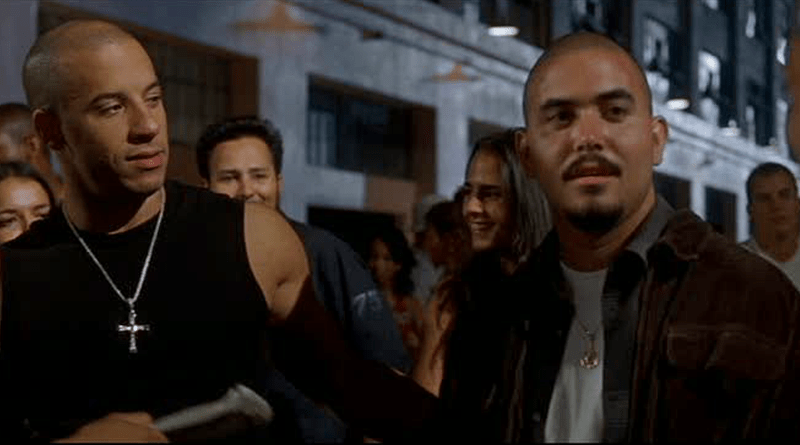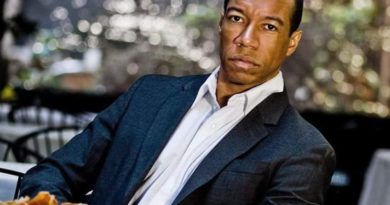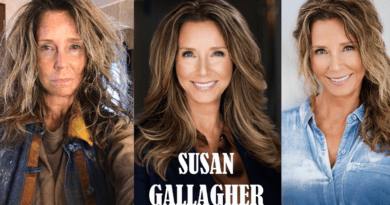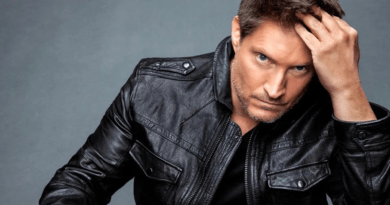Noel G.
Veteran actor Noel G is a force to be reckoned with, having starred in the legendary franchise The Fast and the Furious & Furious 7, the Academy award-winning film Training Day, the hit film Bruce Almighty, and many others. Noel has dozens of projects in the works including Wash Me in the River starring Robert De Niro. When Noel is not acting or producing, he uses his platform to inspire people to treat others with kindness and to embrace your path.
ILLUMINATE: Hi Noel! I’m really happy to have you in ILLUMINATE magazine.
Noel G: Noel G, a.k.a. Hector, whatever, whatever.
ILLUMINATE: Actor Noel G.
Noel G: We’re creative, we gotta keep creative with it.
ILLUMINATE: You were mentioning a little bit about Hector. There’s that whole joke that you played Hector like eight times. But the one I want to talk about right now is how you played Hector in THE FAST AND THE FURIOUS, the original in 2001. And then you were brought back for the FURIOUS 7 in 2015. What was it like to step back into that role 15 years later? And how was it being back with most of the original cast? The vibe. The story, did you feel like it fit in the universe well?
Noel G: First of all, to come back is a blessing. I was like when they called me, I was like, you sure you got the right number? I’m like, are you sure you’re trying to get in touch with me or whatever? But always a blessing to be back and be remembered because that’s what we always hope for and to be back was an awesome thing. I got to thank a lot of the producers on that, Vin Diesel for that, you know, those were part of the reasons why I came back and was back and to be in Race Wars. And the reason why they had me back is because when they came back to Race Wars in PART 7, which was actually original in Part 1, they thought that it would be cool to see some familiar faces from Part 1 at Race Wars Part 7.
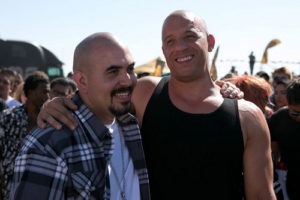
So like someone was still holding down the ground. You feel me? Yeah. So to come back is always a blessing. To be remembered is always a blessing. That’s what you always want. I always tell people “treat people how you want to be treated.” I don’t care if someone’s craft service, wardrobe or the director of the film, treat everybody the same. That’s just how I do it.
It was cool to come back and be in that universe just to see it again and see how they do it. It’s crazy cause you would think you were at a real car show. You know, when you’re there, it’s like, Oh, are we filming a movie? Or like, are we at a real car show I was like, you get confused. You know what I’m saying?
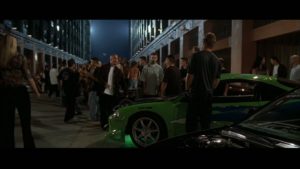
ILLUMINATE: I love your mindset of treating everyone equally. When I’m on set, that’s my mindset, too, because you wouldn’t be able to make the film that you’re making without every single person that’s there, and that’s a great thing for actors or other filmmakers or just anyone in general. Just treat people the way you want to be treated. I love your positivity, and I love that you keep it real. When I worked with you, that was something I really liked. You were a genuine person.
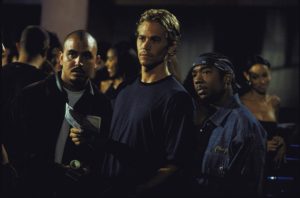
Noel G: Thank you. I appreciate it. And I always tell people, I can still learn until the day I die. I’m still learning. But one bad attitude on a set can ruin a whole set and change the whole mood. I always tell people, just love people. And I love people, I’m a people person. I never forget where I came from, but anyways, love people, love everyone, treat everybody cool, never forget where you came from because at the end of the day, it don’t matter what your title is, everyone is a human being.
ILLUMINATE: Everyone was a part of this team. And you’ve been doing film for a long time. According to IMDb your first credit was in 1998 and you’ve been in over 225 films and TV shows. So I’m kind of curious, how did you get started as an actor and what inspired you to be in this profession?
Noel G: So, I literally no joke, no lie was a right place, right time story. I was homeless at the age of 15 years old. My parents left me at 13. It’s a long story, but I’m going to cut out a lot of the fat, get straight to the bone. I was homeless at 15 and one day I met this girl and she asked me this question.
She said, “How come you always wear the same clothes? And I’ve never seen where you live.” And I remember that day like it was yesterday. And I broke down. I started crying. I told her straight up, I said, I’m homeless. I don’t got a place to live, I’m on the streets. And her family took me in.
ILLUMINATE: Oh, wow.
Noel G: I was running the streets, you know, running amok. I was just running the streets, hanging out with the wrong crowd. And it was her dream to be an actress and a model. I never thought about that a day in my life. I’m running the streets, I’m 15 years old with my know-it-all street attitude, couldn’t tell me this, couldn’t tell me that, never even thought that someone like me could even be on TV, you know, because I’m just acting a fool on the streets.
And so one day she asked me to go to this acting class with her, and I was living with her and her family. I go to this acting class and I’m not going to lie, just keeping it real, once again, but when I went to the acting class, I thought everybody was dorks and nerds so I started like talking smack and literally I was right place, right time. There was a producer who was scouting talent, comes up to me after the class and says, “Hey, you want to be in a Taco Bell commercial?”
And I thought he was on some B.S. I thought he was, you know, whatever. But it ended up being real. Two weeks later, I’m on a set at 15. I did a Taco Bell commercial. First thing I ever did in my life. It was crazy because when I was 15 at the time, I was ignorant to residual income.
I didn’t know what residual income was. I thought it was like, you have to work to get paid, work to get paid, work to get paid. I did not know what residual income was. So every time the commercial was shown, I’d get a check, and I thought it was a computer mess up. I didn’t know that’s how you really get paid, right? So I’m getting all these checks, got a little weird because they ran this commercial for like, quite a while and I went from pretty much nothing to bling bling overnight, like money.
So I called up the producer and I said, you know, why I keep on getting paid? And he goes, No, no, no, that’s right. He goes, That’s how you get paid as an actor. I said, What? I said, Well, now I want to be an actor. You know, the lottery at that age when I had nothing to something, right?
So he hooked me up with a manager friend of his. I didn’t know nothing from nothing. I go in just, you know, like this, whatever, whatever. And the manager guy was like, I like you, man, I’m gonna see what I could do for you. And everything he started sending me out of was Gangster #1, Cholo #2, Trigger. What? I’m like what? I thought I was here to act.
I grew up like this in real life. And that’s how the acting got started. So here’s how I always end the story.
I can honestly say, when I first got into this business, it was all about the money because I never made so much money so quickly. I’m just keeping it real. But as I started doing the business, I grew a true passion for it because this is one of the funnest businesses in the world. You never do the same thing. You’re always in a different place, you know, you’re always meeting new people. I wouldn’t give it up for the world. I have worked a lot of 9-5 jobs. It took me eight years to get my first film after I got that commercial. I worked at Olive Garden, Denny’s, Toys “R” Us, Burger King, Walmart. K-Mart was my longest job. I worked at K-Mart on the cash register for one year. Been there, done that. Eight years to get my first film, and that’s how the acting took off. But long story short, the way I end this story is when I first got into it, I can honestly say, yes, of course, it was about the money because I never made so much money so quickly. But as I started doing it, it became a true passion of mine. And I love this business.
ILLUMINATE: Wow. You brought up so many good points in this question. First off, I’m going to touch on that. That’s an incredible story of how you ended up in the business. And you’re right, that really is the right place, right time scenario. But it took you on a completely different path than what you could have ended up. You’ve brought up so many good points, especially about integrity and treating people right. You just have so many great nuggets of wisdom. I think that our viewers are really going to appreciate that. You’re a true professional and you’re a good person, and that’s something I really like about you.
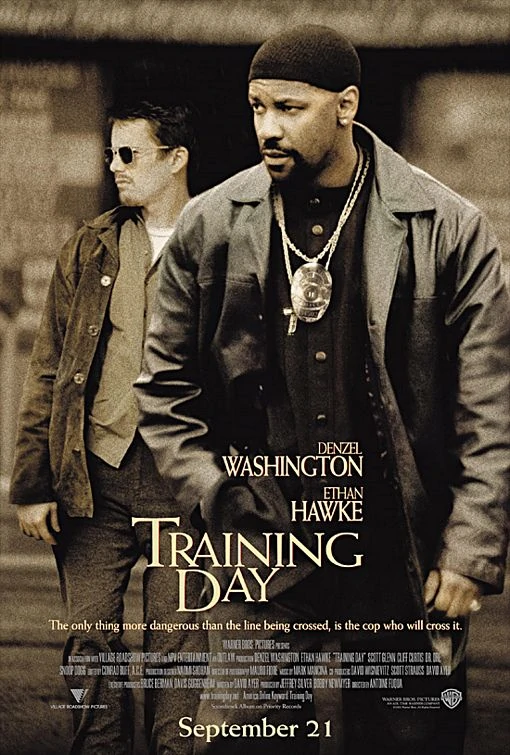 And now let’s segway a little bit into one of the most famous films you’ve been in. In 2001, you were starring alongside Denzel Washington and Ethan Hawke in TRAINING DAY. Do you remember what your audition for it was like? And was your audition very different than how it ended up in the final film? Was your audition very close to how you ended up performing it, or did it change a lot?
And now let’s segway a little bit into one of the most famous films you’ve been in. In 2001, you were starring alongside Denzel Washington and Ethan Hawke in TRAINING DAY. Do you remember what your audition for it was like? And was your audition very different than how it ended up in the final film? Was your audition very close to how you ended up performing it, or did it change a lot?
Noel G: No, the audition was pretty much the same. I love the director, Antoine Fuqua, because he gave us range and let us play with the character a little bit. So a lot of it was ad libbed also as well. But we stuck, of course, to the script, so it wasn’t too much different from the audition to being on set. The only thing that was crazy about that set that was the most crazy was Denzel actually got sick and when he got sick, I was only supposed to work on that film one week, and I ended up getting seven weeks out of it because Denzel got sick and they were having scheduling problems because of it.
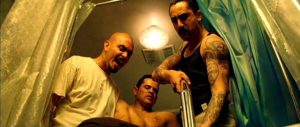
So they had to keep on rescheduling and then scheduling, rescheduling then scheduling that it was a back and forth tug of war. So one of the things that made that scene really difficult to film, and here’s a little fun fact for you, is we filmed it every Monday for seven weeks straight. That one time it was filmed on a soundstage.
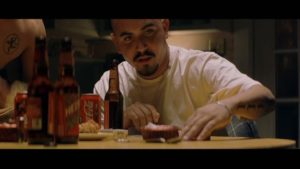
So it was so hard to come back and take off a week later from where we left off. So literally we filmed that that whole scene was supposed to be filmed in like three or four days, but it took us eight days total to film that scene. And this is the craziest part though. We filmed it Monday, Monday, Monday, Monday, Monday, Monday, and then Tuesday and we finished and then it was done. So imagine filming the scene Monday. That’s a wrap. Come back a week later. Monday, that’s a wrap. Come back a week later. It was a difficult deal, but doing that scene was fun. That’s an iconic movie that’s definitely in the gangster collection that’s right there with the Scarface’s, the Goodfellas, and A Bronx Tales. So to be a part of that was, of course, you know, a lifetime achievement.
I guess you can say there’s something so wonderful and spectacular to be a part of that film. And that’s actually the film where Denzel won his Oscar, but to be a part of that also, as well, is what made it so great. For him to win it for that film, you know, heck yeah, I’ll take that, too.
ILLUMINATE: Right.
Noel G: He should have won it for The Hurricane or all these other movies he did before that, but you know, hey, I’ll take the movie that he finally won it on.
ILLUMINATE: You’re technically in an Oscar winning movie, you know that?
Noel G: That’s what I like. I’ll take that. I’ll take that one. But I just want to give Denzel his props. He should have won it way before.
ILLUMINATE: Right? He’s very talented. And you actually ended up reprising that role in the TRAINING DAY series. And I’m a little curious about that because that’s a different cast. It’s a different medium. You’re going from film to TV. How was it transitioning into that? Did it have a similar vibe or was it different?
Noel G: Yeah, it was a lot different, to be honest with you, because they switched a lot up. Right. Bill Paxton, rest in peace, that guy is a wonderful actor. He became a great friend on set. A blessing that I got to work with him before he left. It was funny. I actually did a movie with his son right after.
Wow. Yeah, that was kind of hard and long story short, but that show was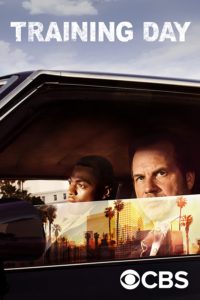 just so unfortunate because Bill Paxton passed away, rest in peace. That is what messed up the whole show and why it didn’t go any further but yeah, it was just real different because, you know, they were trying to make it a television show, which they did. But, you know, everything was kind of switched around me. And I believe Tom Berenger were the only original characters from Training Day who came back to the show. So that was cool also, as well to be remembered. But, you know, it’s unfortunate that the show didn’t get to do better than what it was already doing because Bill Paxton passed. Of course, they couldn’t move on.
just so unfortunate because Bill Paxton passed away, rest in peace. That is what messed up the whole show and why it didn’t go any further but yeah, it was just real different because, you know, they were trying to make it a television show, which they did. But, you know, everything was kind of switched around me. And I believe Tom Berenger were the only original characters from Training Day who came back to the show. So that was cool also, as well to be remembered. But, you know, it’s unfortunate that the show didn’t get to do better than what it was already doing because Bill Paxton passed. Of course, they couldn’t move on.
That was kind of a touchy subject because it was so awesome to be doing the show. But then that happens, coming out of left field, and that did a whole turnaround for us. They just wanted to stop everything out of respect, put it on the back burner and see what they do from there.
ILLUMINATE: I can imagine that would be really hard. And when I saw that you were in TRAINING DAY, two different versions, that must be really interesting as an actor to be in both because there’s so many projects where that isn’t the case.
Noel G: Yeah. I mean, it is you know, it’s again, being remembered is always a blessing. So that’s the hope until I die is that I can just stay busy and, you know, keep on moving forward.
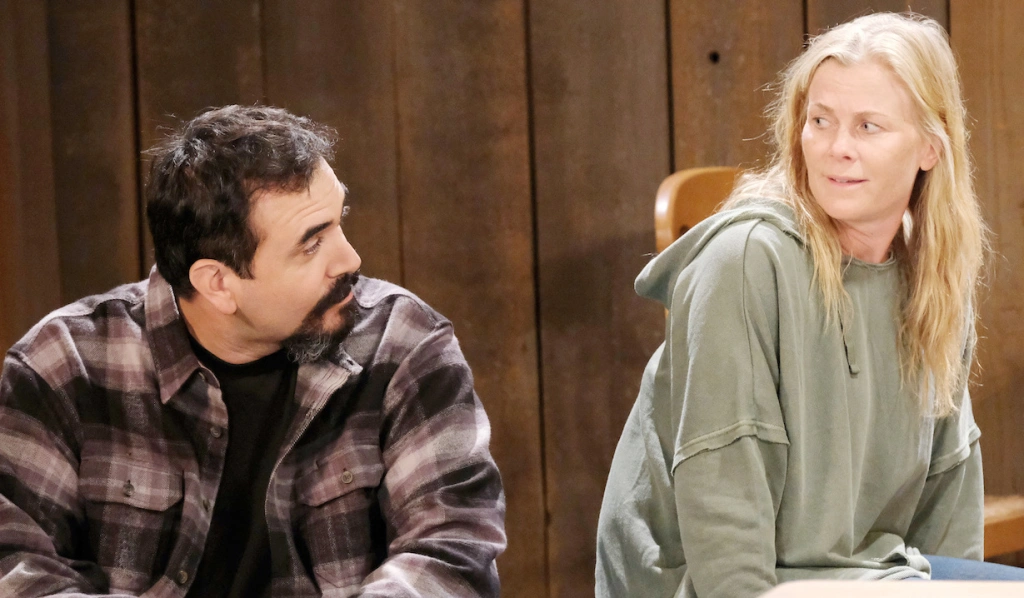
ILLUMINATE: And you’ve been in so many TV shows, so many movies. Some of the TV shows you’ve been in were FRESH OFF THE BOAT, DAYS OF OUR LIVES, THE MENTALIST, THE WALKING DEAD, and then countless films. Do you have a particular moment on set that stuck with you? One set story that has really affected you in everything else you do?
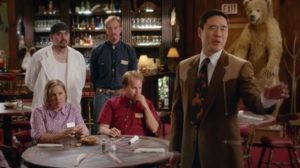
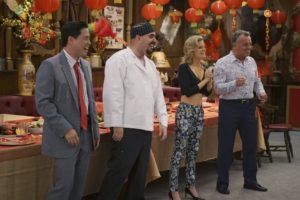
Noel G: One thing I learned, you know, it was funny. It was me fresh in the game. This was literally at the starting of my career. I got a big part in X-Files, and I get shot and I die or whatever. But I wanted to be the tough guy. So what ends up happening is I get shot and I fall on my knees.
And one of the stunt guys comes over and he says, you know, hey, you want some kneepads because you’re falling pretty hard. And I was like, no, no, no, I’m cool, man. I’m like, I’m tough. I got this and, you know, again, I’m fresh in the game. I was very young. You live and learn. I didn’t know any better, and I wanted to be the tough guy to show, like, I can handle this and I can do this, like I got this. And so, you know, we do the scene again. I have the stunt guy respectfully, to his credit, asked me at least six or seven times, do you want kneepads? And I said, no, each and every single time. By the end of that shoot, I had six knees. I had three knees on each leg. I was bruised up, hurt and battered like I’ve never been before.
I couldn’t even walk. And it was all because I was young, immature, didn’t know any better. And wanted to really like, I thought like I gotta put my all into this to keep on getting hired, such a great scene and all these different things right? And what I learned is on set, always listen first and foremost to the people above you who tell you something because they know better. Number 2, you never have to hurt yourself on the set.
That’s why we have makeup people and stunt people and people there to coordinate things so you can be as safe as possible. Yeah. And that’s the true acting comes in where you have to be raped or kicked, or punched or shot. Your acting should bring that to life. There’s a way to coordinate certain things to where it’s like a dance in a movement where if it looks like it was so brutal, but yet everything was so coordinated because you knew every move what was coming to make it look and feel so real.
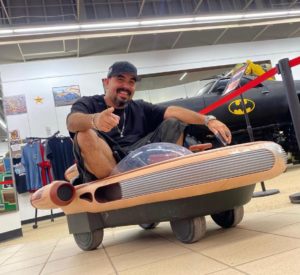
So that was one thing that I learned on set. So that always stuck with me to this day and in a lot of my movies, I get shot and I get killed, you know what I’m saying? So ever since that I was like, nah, pad me up, let’s do it right, let’s coordinate, let’s rehearse and always be safe. So that was one of my biggest lessons in the game.
Now, I got thousands of stories like that, but that was one of my biggest ones that I always share with people. You don’t have to, you know, a lot of a lot of actors think like, oh, like yours is the extreme example. So you get it. You don’t got to cut off your left arm to be an actor in a movie because the next movie might require both arms.
Just to give you one small example, there’s just the tiny, itty bitty ones. I had a friend of mine who went out for Pirates of the Caribbean, and he didn’t know any better. Again, you live and learn and you don’t know until you know. You’re never stupid and no one’s ever ignorant until they know.
Once you know, and you keep on doing it, then you’re either ignorant or stupid. But you’re not stupid until you know first, right? Would you agree with that? I had a friend of mine where he went out for Pirates of the Caribbean Part III, came in homeless looking and like long beard and scruffy face. They loved him.
They loved him. They called him back and said, we want to see the next day. The next day he comes back, shaved and in a suit because he didn’t know any better. He thought it was like a real job interview at like, Target or something like that. So he came all clean cut and in a suit and he came trying to impress, because he thought, but he didn’t know any better.
Right? Why did you shave it? Why did you do all, we like you like that because you look like a dirty, scruffy pirate. And that’s what we wanted. In the end, he lost the job because of that.
ILLUMINATE: You have your own production company called Entangled Entertainment, and you’ve produced a few of your own projects. I’m curious how you started producing and what has the transition from acting to producing been like? You’re still primarily an actor, but that is a big jump. Do you have a favorite film you’ve made as a producer?
Noel G: So, you know, your life is a journey. You never know where it’s going to take you. You get into one thing and then you start seeing other things and then you’re like, oh, wow. Like, I could do this, I could do that. And that’s exactly what happened. So again, I was right place right time to become an actor, start working on movies, and I’m like, Oh, wow, like I could produce, I could direct, I got story ideas of my own, that I would like to, you know, flesh out.
And so that’s kind of the journey that I’m on right now. Being in the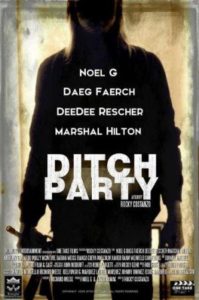 business of acting, it’s opened up my eyes to other things that I didn’t know I would want to try that. I want to try this. So right now, we’ve done two movies, A Ditch Party, which has a positive message that’s about a high school shooting and a long story short, the message of that movie is never insult someone publicly because you never know who might want revenge privately. That’s why a lot of high school shootouts were happening, because kids were getting insulted and put down and then they were forget my life, but forget your life as well. I take people with me. So I made a movie that came against that, trying to open up eyes and open up hearts to stop high school shootings. So that was my first movie.
business of acting, it’s opened up my eyes to other things that I didn’t know I would want to try that. I want to try this. So right now, we’ve done two movies, A Ditch Party, which has a positive message that’s about a high school shooting and a long story short, the message of that movie is never insult someone publicly because you never know who might want revenge privately. That’s why a lot of high school shootouts were happening, because kids were getting insulted and put down and then they were forget my life, but forget your life as well. I take people with me. So I made a movie that came against that, trying to open up eyes and open up hearts to stop high school shootings. So that was my first movie.
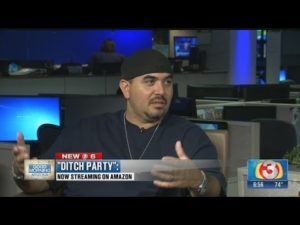
And then the second movie was just a straight up horror movie. It had nothing to do with nothing. We just went for it. Did it. It is what it was. We were just hoping for the best on that one. No message in that at all. That was just pure entertainment. We’re making movies that now are sticking to the purpose because one thing that I learned in life is if you give yourself a vision statement and you stick to that vision statement of what your purpose is that you want done, you will always succeed because no matter what, you stuck to the source.

And the reason why my movies didn’t do so great is because I did not stick to the vision statement, which means I got out of alignment with God. And this is according to my belief. I never press my belief upon anyone else, to each their own. No judgment. Your belief is what you believe, and I respect that. Your belief is what you believe.
And I respect it. I’m talking about my own belief, but I got out of alignment with God. And when you get out of alignment with God, it can take you on that journey that you’re not supposed to be on. And that’s the reason why I feel like my movies weren’t successful.
So now I’m sticking on the alignment that God has put me on. Sticking with the vision that was given to me by Him to stick on that journey and that journey only, to do what’s right according to Him, by Him, with Him. So now we’re making a documentary, and I believe this documentary is going to be successful for the fact that this is something that has to do with my company, which is Entangled Entertainment.
And my vision statement is to continuously and abundantly manifest the kingdom of God throughout the world through TV and film for Jesus Christ. And if you know your vision statement and you know what you’re sticking to, that will always, always make your purpose succeed, because you know what your purpose is. And that’s why a lot of people don’t know their identity, because they don’t know what their purpose is in life.
And you know what gives you peace of mind? Is being in your purpose. And if you’re in your purpose, you have peace of mind. So, I just say that anybody can do it according to what their purpose is. The reason why a lot of people are all over the place and don’t have peace of mind is because they’re living out of their purpose.
They’re doing everything else except what God told them to do. And so, you know, that’s why I tell people, live according to your purpose, you know, fight for what you believe in. And that’s what will always give you peace of mind, give you a right heart and mind and you’ll always be successful, whether it takes one year, ten years. You’ll get there.
ILLUMINATE: I love that. And I think that a lot of people struggle with that, too, because, you have these ideas, these goals in mind, and you’re worried if I don’t hit this in this year, that it’s never going to happen. Or I failed if I didn’t hit it within like one to two years and it takes a longer time.
But I think that’s really good that you’re out there spreading that message and that you are aligning with your purpose and that you are telling people that this is what I’m doing, this is my purpose, this is my company’s purpose. And that’s what I’m going to do with it and with my platform.
The next thing I was going to ask you is, is there a character type or a genre that you haven’t yet done but that you really love to in the future?
Noel G: You know, I admire actors who are like chameleons, you know, actors like Joe Pesci, who could play this and that, from My Cousin Vinny to Goodfellas or Robert De Niro, all the greats, you know, Tom Hanks. Leonardo DiCaprio is doing some amazing stuff right now. Will Smith, so of course, I want to add, you know, that that’s what acting is all about, you know, is when he becomes someone else.
So I would love to play different roles and that’s another reason why I’m producing is to show myself in a different limelight from what I’m always getting casted as. So I always tell people if no one’s going to give you the opportunity then give the opportunity to yourself, you know, somehow, someway, even if you make a short film.
All right. So that with the streaming services that we have out, where everyone could self stream, there’s no reason why you can’t shine in a different light and show people, hey, I can do this, I could do this, I could do that. So I always tell people, I admire actors like that. So, I want to be a chameleon actor.
Don’t get it twisted. I’ll always play the bad guy. I love playing the bad guy, but I just did a big movie with Kate Bosworth, Ving Rhames and Ryan Phillippe. It was called Locksmith. And I played a police officer. I played a detective in that movie. So it was a different type of role. So I’m starting to branch out a little bit more and do some different things.
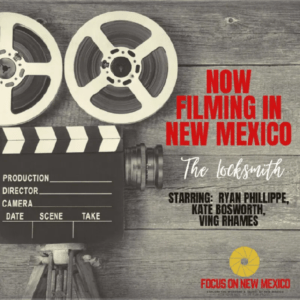
But of course, I want to play different roles and do different things because those are the actors that I admire. The ones that can go from A. B. to C to D, so…
ILLUMINATE: I can see you in multiple other types like I could see you playing a doctor, a lawyer. I think it would be really cool to see you try a variety.
Noel G: It’s time. It’s time. That’s how I spend time. You got to be patient, you know what I mean? So I’ve been in the business 32 years. I could wait another few years. It’s all good.
ILLUMINATE: You’re doing amazing. And speaking of that, because you have so many films right now in post-production, I don’t know how many I saw there in post-production alone, but here’s just a few. You were in CORSICANA, my friend Robert Johnson produced that one and also you have other films like BERMUDA ISLAND, which we worked on together, and you have a film called BRIDGE TO SOMEWHERE, and then you have multiple other movies that are in pre-production, like RIPTIDE, Q and THE PANIC.
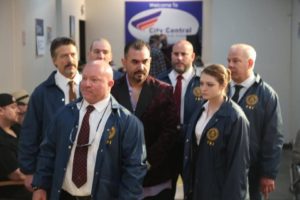
Are there any of things you want to talk a little bit about and the upcoming projects that you want to give us a little scoop on, if you can?
Noel G: I just gave you one, that movie that I mentioned where I play a detective is called Locksmith. But I’ve been very blessed. You know, I’ve been very blessed to stay busy, and that’s something that I’m very thankful for. I got a movie coming out with John Travolta called Paradise City, another one with Robert De Niro and The Amigos called Wash Me in the River. Another one with Mickey Rourke called Replica. I’m coming back to the Mayans.
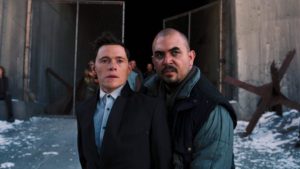
So I’ve been very blessed to stay busy. A lot more stuff coming out. This documentary and I’m working on some other things, some stuff that’s pending. But, you know, until it’s locked in, I don’t like to say anything yet. I always say until you sign a contract, talk is talk.
But long story short, I’ve been very blessed and got a lot of things popping up. Keep up with me on my Instagram @actornoelg. Keep up with me there. If you guys are really interested in what’s going on in my life on my side of town, keep up with me on my Instagram. I’m very personable on there, and that’s what’s up.
ILLUMINATE: This was so amazing getting to talk to you and learn a little bit more about your story and also getting to hear your perspective on the industry, on acting and on life too. This has been a real honor. So thank you so much for being on Illuminate Magazine.
Noel G: It’s all love. You know, my last words that I always tell people is I love you, God loves you. And I always say, and again, to each their own, no judgment. I never pushed my belief upon anyone else. But the message that I do like to share is if you put God first in your life, everything else will work itself out.
So I say that humbly and I always wish everybody the best. I want to see your dreams become a reality. Like my dream has become a reality. If me, some kid from the streets did it, you can definitely do it. So thank you, guys. Thank you, guys, for watching. Thank you, Illuminate magazine for having me on. Thank you for having me on.
You interviewed me and listened and you’re a very good interviewer. What I love about you is you’re a very good listener, you know, and I’ll give this one last nugget and I’m done. I always tell people, you know, one of the best things in life that I’ve learned is to listen. You know what you do when you listen to someone talk?
You bought yourself time to be heard when it’s your turn to speak. So I always tell people, listen to people, and that’s one of the best things that you can receive in life. Love you guys!
ILLUMINATE: Love you! Thank you!
FOLLOW NOEL G:
Instagram: @actornoelg
ILLUMINATE: Hello, Sean. Thank you so much for being here on Illuminate Magazine. I’m so excited and honored to interview you. You’ve had quite the extraordinary career with roles in films like KARATE KID III, being on The BOLD and the BEAUTIFUL, The YOUNG and the RESTLESS, GENERAL HOSPITAL, and your series, STUDIO CITY. You’re an author. You’re a podcast host. You have so many talents. And so it’s really an amazing opportunity to get to talk to you about those today.
KANAN: Thank you. It’s a pleasure to be here. When you say it all together like that, it sounds pretty good.
ILLUMINATE: It is really good. So I’m curious. How did you get started? When did you get the acting bug?
KANAN: When I was about 14 or 15, I remember a friend of mine wanted to be a model and so there was this open call for models and I decided I was going to tag along with them, having no interest in doing that myself. Well, unfortunately for my friend, he didn’t get signed, but I got signed. So I started doing some modeling when I was about 15 years old.
No catalog stuff, not super high-end stuff, but it beat the hell out of flipping burgers, which I was doing before. I wound up getting cast in a commercial, which was a SAG commercial, so I had no idea how important that was going to prove to be later in my career. But at 15, I got my SAG card, and it’s still crazy to think that I have been a member of SAG for 40 years.
Anyway, when I decided I really did want to pursue acting, I eventually transferred from Boston University to UCLA in ‘87 to finish my political science degree and pursue my acting career. And the fact that I already had my SAG card was an enormous advantage. I got a couple of TV jobs and then in ‘88, I got KARATE KID III and that really started to open things up for me.
ILLUMINATE: Wow. It’s amazing that you’ve had such a long career and also that it was completely a surprise that you ended up doing it. Such a happy, exciting surprise! I wanted to also touch on the fact that yes, you did have that breakthrough role as Mike Barnes in KARATE KID III. This was one of your first major roles, and it was a major franchise. What was it like getting to be a part of that world and play one of the younger villains? And of course, did you have karate experience already? How much karate did you have to learn for the role to be a part of this universe?
KANAN: I’m going to do a gratuitous plug here. All of this I cover in my book “Way of the Cobra”, but let’s see, there’s a lot to unpack there. I just want to say that this is a role that I did over 30 some years ago, and the fact that it still has interests from fans and has some relevance to it is just such a blessing.
Obviously, that’s a tremendous function of the success of Cobra Kai on Netflix. For me, when I was a kid, like a little kid, I used to race home from school to go watch Happy Days, and that was what was on during my lunch time, right? And so before I ever knew that Pat Morita was Mr. Miyagi, because he wasn’t then, he was Arnold on Happy Days. But I was a guy that bought a ticket to go see The Karate Kid and The Karate Kid II in the theater. And then to find myself starring in the film alongside Ralph Macchio and Martin Kove, and it was surreal. It was there I had very little time to have that pinch me moment because it was, you know, it was serious.
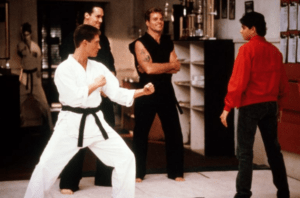
Like you said, it was part of an internationally successful franchise. And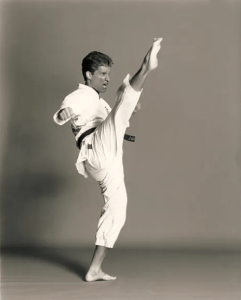 there was a lot of pressure and a lot of things to be done. Fortunately, I had begun studying martial arts when I was about 14 years old, so I had a pretty strong basic background of Japanese karate when I was auditioning for the film, and that, of course, made a huge difference. There’s no way, I believe, that in the amount of time that they had, they could have taken somebody with no martial arts experience and made him look like a national champion, high-level black belt. So that really did come in handy. It was still one of the most seminal experiences in my life. It’s dramatically affected the trajectory of my life both professionally and personally and continues to.
there was a lot of pressure and a lot of things to be done. Fortunately, I had begun studying martial arts when I was about 14 years old, so I had a pretty strong basic background of Japanese karate when I was auditioning for the film, and that, of course, made a huge difference. There’s no way, I believe, that in the amount of time that they had, they could have taken somebody with no martial arts experience and made him look like a national champion, high-level black belt. So that really did come in handy. It was still one of the most seminal experiences in my life. It’s dramatically affected the trajectory of my life both professionally and personally and continues to.
ILLUMINATE: I love how that was such a full circle moment of being a fan 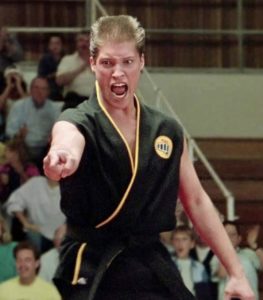 and then getting to be a part of this world. Let’s talk a little bit more about KARATE KID and COBRA KAI. You’re a member of this universe. Have you had any crazy fan experiences as a result? And also, you’ve probably seen all the theories about you coming back now that Terry Silver is on the show. You probably can’t tell us much, but can we expect any Mike Barnes?
and then getting to be a part of this world. Let’s talk a little bit more about KARATE KID and COBRA KAI. You’re a member of this universe. Have you had any crazy fan experiences as a result? And also, you’ve probably seen all the theories about you coming back now that Terry Silver is on the show. You probably can’t tell us much, but can we expect any Mike Barnes?
KANAN: I can neither confirm nor deny. All I can say is keep watching.
ILLUMINATE: I’m a big fan, so of course.
KANAN: If you’re a fan of the show, keep watching.
ILLUMINATE: I will!
KANAN: Anything crazy? I got to be honest. I’m really fortunate that there are two fan universes that I’m very firmly entrenched in. The first is obviously the Karate Kid, Cobra Kai fan universe and the second is the daytime soap opera fan-verse. You know, from all the work that I’ve done on The Bold the Beautiful, The Young and the Restless, in General Hospital, and both groups of fans are absolutely incredible.
I’ve had really almost nothing but wonderful experiences with all of them with the success of my book, “Way of the Cobra.” I’ve had all these people, all over the world, that the book has really resonated with them.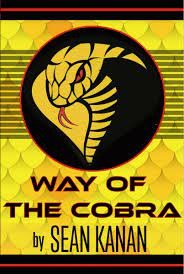 And just today I got a package from a guy named Dave Greer in the UK, and he is an amazing guy and a fan of the book. He sent me (let me show you what he did) he had these beautiful pins made. Let me see if I can show (shows camera) these beautiful ”Way of the Cobra” pins made.
And just today I got a package from a guy named Dave Greer in the UK, and he is an amazing guy and a fan of the book. He sent me (let me show you what he did) he had these beautiful pins made. Let me see if I can show (shows camera) these beautiful ”Way of the Cobra” pins made.
ILLUMINATE: Oh, those are beautiful!
KANAN: And he had these amazing ”Way of the Cobra” shirts made, which he sent me like a bunch of them.
ILLUMINATE: Oh, those are so cool.
KANAN: Yeah, and he did this on his dime and sent them across the Atlantic to me. And just what a wonderful … So this is the kind of people that I’ve been exposed to, not only through Karate Kid, but my book. Part of the concept of the book is I am the sensei and people are in my dojo, but what I say is that I recommend becoming a sensei yourself and paying it forward. And that’s one of the foundational principles of ”Way of the Cobra” and so I get all these amazing things all the time from these wonderful fans. And, you know, of course they all want to know if I’m going to do Cobra Kai. And so I just keep saying the only thing I can say, which is keep watching.
ILLUMINATE: That’s so exciting. And I love that you have such a strong fan base, both as Mike Barnes and Deacon Sharpe. You have just a great amount of support and fans who love your work and have loved you work for such a long time. Let’s talk about that other fan base. First, let’s start with General Hospital.
You played the iconic AJ Quartermaine. What are some of the differences you’ve experienced working in soap operas versus primetime series and feature films? Because I’ve heard that soap operas go really quickly. It’s not shot the same way as other productions, so I’m curious about that.
KANAN: Do you see all this? (Holds up a thick stack of scripts) This is probably about 100 pages. This is what I have for this week. So when you’re doing that much volume of dialogue, you need to know what you’re saying and be able to execute it very quickly and be able to make very strong and very quick choices. As a result of COVID, we’ve basically eliminated rehearsal but they found out that the actors could actually handle it. And so we show up and we get makeup and get in wardrobe and we’ll have some time to race around and find the other actors in our scenes and run it. But when we hit the floor, when your scenes are up, you do one rehearsal, which is for camera and then it’s go time.
We really try and get every scene within one or two takes. If there’s a camera problem, obviously, we’ll keep doing it. But some days we’ll have 45 or 50 scenes and you just have to get through it. That’s one of the biggest differences from working on nighttime television. Film, you shoot much less on a day in the film. You might shoot six to eight pages… which is a luxury.
Obviously, when you do theater, it’s the most conducive to the very best work because you have an elongated rehearsal process. But the caveat of theater is that once the curtain goes up, that’s it. There’s no retakes. So you’ve got a lot of time to prepare, but you’ve got no time for error. Each different medium has things that are positives and things that are challenges. I like all of them as far as having any semblance of a normal life, I like daytime because I’ll give an example tomorrow. I’m working and I think I’m in like the first three scenes and then I’m done for the day. We go on camera at nine, I’m going to shoot three scenes. I’ll be done with work by like 10:15 in the morning.
ILLUMINATE: I love that you really want to take on the different challenges of the different mediums.
KANAN: They’re different challenges. One of the things that you might like if you’re a single person is it’s great and exciting, sexy to go on location and do a film. But if you’re someone with a family, it may mean that you have to leave your family for six weeks. So it depends where you are as to whether or not those quote-unquote challenges are challenges or they’re things that are pluses. For some people, they are challenges. For other people, they’re some of the best aspects of doing a film.
ILLUMINATE: Exactly. You had six younger actors playing AJ before you stepped into the role. So how did you transition into playing AJ when he was the troubled young adult that he was? And what was that character development process like?
KANAN: I think you always have to put your own stamp on every character. And so complete respect to the other actors who portrayed the 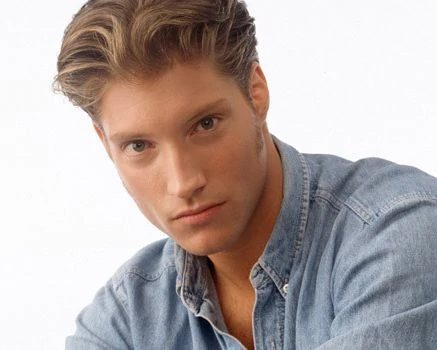 role, but I was only interested in delivering what my truth, based on the material was, within the parameters of who I am as an actor, not looking to what they had done before. So, yeah, AJ was a very troubled guy. And it was a period in my life where I had a lot of turmoil and so I was able to draw on that. But here’s the thing. In retrospect now, in the period of my life when I don’t have turmoil, when I’ve figured a lot of things out, it wouldn’t preclude me from playing it.
role, but I was only interested in delivering what my truth, based on the material was, within the parameters of who I am as an actor, not looking to what they had done before. So, yeah, AJ was a very troubled guy. And it was a period in my life where I had a lot of turmoil and so I was able to draw on that. But here’s the thing. In retrospect now, in the period of my life when I don’t have turmoil, when I’ve figured a lot of things out, it wouldn’t preclude me from playing it.
ILLUMINATE: Let’s talk about Deacon Sharpe. The Bold and the Beautiful and The Young and the Restless. You started first playing Deacon in 2000. Deacon is such an iconic character who has done so many things, good and bad.
KANAN: Right.
ILLUMINATE: We’ll talk about some of his craziness in a moment. But first, how has your portrayal of Deacon changed over the years from when you first started? 2000 to now?
Kanan: That’s a really good question. It’s a good question. I’ve been on, off and on since 2000. This month is the 35th anniversary of The Bold and the Beautiful, which is an extraordinary, extraordinary accomplishment.
How has it changed? Well, the character has changed because he has been to prison. He’s legitimately trying to be a better man than he was. He’s had a lot of consequences and hard life experience, which I think has allowed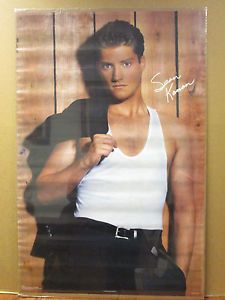 him to reflect. When Deacon first came on the canvas, he was just a ball of fire. He was just a bad ass and dangerous and sexy and all this great stuff. It was so much fun for me to play. I used to always joke how much cooler Deacon was than Sean, but, you know, now it’s fun for me to play the character because I think that with some of the ups and downs that I’ve encountered in my life, I’ve achieved some perspective, and I’m able to bring that to the character now where I don’t necessarily know that I would have been able to bring all of that 20 years ago.
him to reflect. When Deacon first came on the canvas, he was just a ball of fire. He was just a bad ass and dangerous and sexy and all this great stuff. It was so much fun for me to play. I used to always joke how much cooler Deacon was than Sean, but, you know, now it’s fun for me to play the character because I think that with some of the ups and downs that I’ve encountered in my life, I’ve achieved some perspective, and I’m able to bring that to the character now where I don’t necessarily know that I would have been able to bring all of that 20 years ago.
And, if and when the time comes when Deacon has to dip into his bag of tricks, where he’s able to summon the dark side, I know how to do that now. I knew how to do it then, but I know how to do it now, but still play the other part.
So I think the character’s a much more well-rounded character. And I’ve been having a blast playing the character. This is a character that no one else has ever played Deacon Sharpe but me. You mentioned that there were six other people that played AJ prior to me. I’m fiercely protective of this character.
ILLUMINATE: As you should be.
KANAN: Yeah. And you know, Deacon has done a lot of very questionable things, but I have a real genuine affection for him. I see him as the flawed guy that he is that grew up not knowing his father, with an abusive stepfather. We don’t know much about his mother, but we assume she’s probably like a stripper in Vegas or something. This guy did not have an easy go of it and he’s not educated, but he’s very smart. He’s a real survivor. And there’s something about him that I can relate to because I’m a survivor. Many people have said that I’m a bit like a cat with nine lives and I think that there’s an emotional nexus between some of who Deacon is and some of who I am. I’m a guy that’s had much better breaks and much better good fortune and education than he has. But had a couple of things not gone my way, I could have very easily become more like Deacon than Sean.
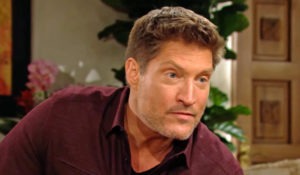
ILLUMINATE: Wow. You touched on the point that you love your character despite being this flawed person and I think that that’s an important lesson for actors. You do have to love that person despite their flaws because you portray that person. A lot of times, these characters don’t realize that if they do something wrong, that they’re villainous or bad. People aren’t black or white. There’s different shades of gray.
KANAN: Right. I think that for me and I think for most actors, you really need to strive to find the many shades of gray in a character as opposed to the monolithic, polar sides. Good people do bad things, bad people do good things. And most people are not completely good or completely bad. I find it very interesting to play the different shades of gray and the character challenges that people face. Sometimes we rise to the occasion and overcome them, and other times, we fall short. Then it’s a question of do we learn from it or do we repeat the same mistakes. I think that those little micro challenges are the things that make human beings interesting and multifaceted. I always try and find those things, especially humor in all the characters. One thing that I’ve really fought hard to infuse Deacon with is I think he’s a pretty funny character. He can be very funny and sarcastic and witty and acerbic and all that sort of stuff and I guess I’m a little like that. I think that’s part of what makes him fun to watch.
ILLUMINATE: Exactly. I’m a fan of the series, DALLAS and J.R. Ewing.
KANAN: Oh, yeah.
ILLUMINATE: He’s hilarious at times. He’s also this nuanced, villainous character. He has his good moments and his bad moments.
So let’s talk a little bit about Deacon’s craziness. Because he’s had quite the wild journey and he’s committed so many despicable acts. From kidnaping Nikki Newman, the attempted murder of Quinn Fuller, blackmailing the Forrester’s.
KANAN: Getting his mother-in-law pregnant.
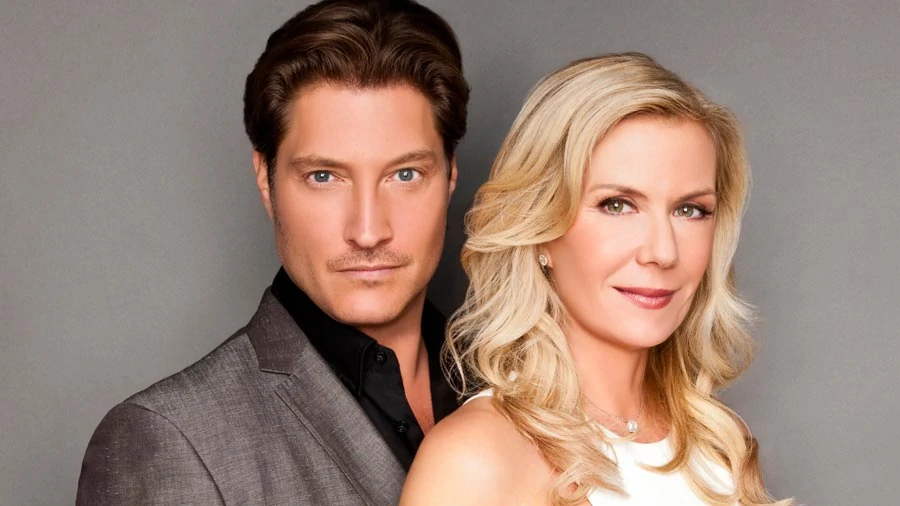
ILLUMINATE: Right! You have the Newman’s, like Victoria Newman in there…and Nikki Newman. You have so many different storylines going on. I was reading a fan article biography. I couldn’t read the whole thing because it was pages, and pages, and pages long. But I was really engrossed in it because Deacon is such an interesting character.
I’m curious, what have been some of the most challenging Deacon storylines, and do you have any that are particularly your favorites to have delved into?
KANAN; Oh, well, I know that the romance with Brooke has been something that was a lot of fun to play. I think there was a lot of passion between the characters. That was a lot of fun. The kind of the devil may
care, younger love thing with Amber was fun. When Deacon dressed up like Elvis to sing to her and that sort of thing. And that the part of Deacon that wanted to become a better man when he was with Bridget, falling horrendously short. I always have a good time when I get to do fight scenes on the show. I had a blast with Thorsten (Ridge) during that fight scene we just did. That was really fun.
You know, for me, I love when Deacon gets to be funny. That’s been one of the most unexpected surprises of my scenes with Kimberlin Brown is that we sort of stumbled on to this dynamic where the two of these people have kind of a very interesting way of relating to each other that is often very funny. That’s been a lot of fun. I did love when I first came on the show, the leather pants and the earrings and the godebi? He was just such a badass, and that was a lot of fun for me too. I really got to show up at work and live out this fantasy of being this guy that was just the coolest guy in the room.
ILLUMINATE: You got to play this alter ego and all these storylines like with Brooke, that’s like everything, and all the crazy adventures and the numerous horrible things your character does. It makes your character so exciting for the audience to watch. And, you’re talking about the comedy that makes you endearing and charismatic while you’re doing all these things…because you’re still charming.
All these women think you’re Prince Charming until something happens. So I think that that is probably one of the reasons why you’re such a fan favorite is because you do bring so many different levels and nuance and layers to this character. And people never know what Deacon’s going to do next.
KANAN: You know, I just honestly, after 20 years, still have so much fun playing the character. I just can’t wait to go to work. I love it. And, you know, it hasn’t always been the case for me. You have jobs that are more fun than others. When you have a career that’s a long career, you’re going to have some jobs that you enjoy more than others, and this is just one that I have consistently enjoyed. And I love the people I work with, both in front and behind the camera. There’s two things I get a feeling for. Every actor gets a feeling when you look at the Hollywood sign, you know, you just do. It represents hope and everything you think you want. And we always say and it’s either kind of smiling at you or smirking at you, depending on where you are in your career and what’s going on. Believe me, I’ve had both.
But I get this really special feeling too, every time I go on the lot at Television City because it’s got such an amazing history. The Carol Burnett Show was shot there and Three’s Company and just so many iconic television shows were there and to be a part of that history is something that is so very special.
ILLUMINATE: I love that it’s either smiling at you or smirking at you. As an actor, it’s so surreal when you get to go on to these studios and these soundstages, when you get to see these films being premiered, you get excited because it’s those things that you see in movies where you’re like, Oh, wow, that’s Hollywood! And then we actually see them in real life like, wow, how am I getting these opportunities? How am I getting to live this dream?
ILLUMINATE: You’ve had such an amazing career! Let’s talk about Studio City. You wrote, produced and starred in this Daytime Emmy winning series about an aging…
KANAN: …Yeah, and there they are right there. (Shows Emmy’s)
ILLUMINATE: So tell us about how you created this series and about your characters on the show. Just anything you want to talk about this series…
KANAN: You know, I’ve been trying for a really, really long time to get Studio City made. It wasn’t originally called Studio City. It was originally called Soap Star. It was one of those projects where I’d work on and I’d put it in the desk, and through the right series of partnerships, not the least of which is with my wife, Michelle, who is also an Emmy winning producer and writer on the show. She’s even played a couple of roles when we need somebody, we throw her in. And our showrunner, Timothy Woodward Jr. We finally got it made. And getting anything made in the entertainment business is, in itself, a Herculean task. And then, when you get it made and it gets a positive response from the audience, that’s amazing. And then, when it gets a positive response critically, that’s doubly amazing. It has been a dream come true. Sam Stevens is a guy that is also very close to my heart. There is definitely a lot of Sean in Sam. I like to say that I’m Sam after a lot of therapy and introspection.
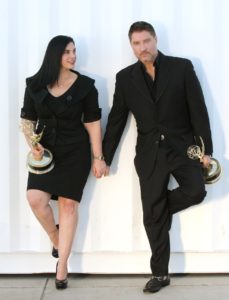
ILLUMINATE: I was going to ask if your character was based on any of your own experiences.
KANAN: Well, Sam is largely based on me, although he’s frequently in situations that I haven’t necessarily encountered. But, I basically called up a bunch of my friends that were actors. They just happened to be really talented and said, “Hey, guys, I got this project” and your friends always want to do something for you if they can. And most of the time, it never sees the light of day. And to have been able to put something together that actually, Tristin Rogers won the Emmy for us. Tristin had never won in his 45 or 50 year career. He’d never been nominated for an Emmy. And I told Tristan, “If you trust me,” I said, “I’m going to write something for you and you’re going to win the Emmy because I’m going to show everybody what I know you’re capable of.” No one else has been able to see this, and you know what happened? My wife is a writer on the show. She’s a brilliant writer, has written some terrific stuff, and Tim Woodward has written some brilliant stuff, and so it’s very much a team effort.
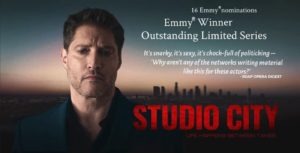
ILLUMINATE: I love that you’re very supportive and you want your friends a part of your projects.
KANAN: Absolutely! I’ve always felt and believe that one of the sure-fire ways of achieving your own success is to help other people achieve theirs with no ulterior motive involved in it, just helping people because you can and I just believe that the blessings come back to you.
ILLUMINATE: Absolutely. The film industry is a really collaborative art form. And when you do get to work with your friends and make those relationships, you’re making art together. It’s such a unique experience. I’m so proud that this series has done so well and you’ve been able to take it off the ground because like you were saying, it is hard to make a project.
KANAN: Yeah, it is, and you know, we’re very excited that this week we’re going to be releasing six new episodes.
ILLUMINATE: Oh, everyone go binge watch it!
KANAN: Yeah, So we’re very excited about that. They are really fun episodes. Some great moments, some great new, not new actors, but appearances by new actors to the show who are wonderful. Justin Torkildsen, who I met on Bold and the Beautiful 20 years ago, had a very small part in the first season, and he’s got a much bigger part in these new episodes, and he’s terrific. And Lilly Melgar came on and she’s terrific, and an actress named Natalie Byrne is fantastic. So I’m very excited for everybody to see these new episodes.
ILLUMINATE: And they’re out on Amazon Prime, right?
KANAN: Yeah, not yet. They’re going to hopefully come out this week. (March 22-28?) It takes a couple of days for Amazon to do their quality control and approve them, so we never know exactly when they’re going to go up, but they usually do it fairly quickly for us. So if everything goes well in a perfect world, hopefully this week.
ILLUMINATE: Well, Amazon probably will, because they know it’s good. They know this series is good!
KANAN: Oh, thank you. I really appreciate that.
ILLUMINATE: I just wanted to touch on a few more subjects like your books. You’ve actually released two other books. You released “Success: Factor X” and also the cookbook, “The Modern Gentleman”, along with your new book, “Way of the Cobra”. Have you always wanted to be an author? And can you tell us a little bit about your inspiration in writing each of these books and the Cobra philosophy?
KANAN: I’ve written for as long as I can remember. I actually started writing something when I was in boarding school, which later became a film called “Chasing Holden” that Lionsgate distributed about a young kid who runs away from boarding school to find J.D. Salinger and so I’d say I’ve written for as long as I can remember.
The first book, The Modern Gentleman: Cooking and Entertaining with Sean Kanan is a cookbook, but it’s a hybrid too. It shows guys how to be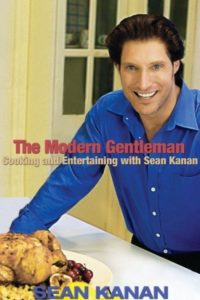 better guys, and it gives women some insight into how we think. And, you know, I love to cook. I find it really therapeutic. It’s just something that really I enjoy doing. And I wanted to put together a book that would teach guys not just how to cook, but how to be a gentleman, but not be a doormat. How do you know that you can be a guy’s guy but still have a sensibility about things that maybe have traditionally been associated with feminine energy. It’s a really fun book. It’s cheeky and quippy and has a lot of good information.
better guys, and it gives women some insight into how we think. And, you know, I love to cook. I find it really therapeutic. It’s just something that really I enjoy doing. And I wanted to put together a book that would teach guys not just how to cook, but how to be a gentleman, but not be a doormat. How do you know that you can be a guy’s guy but still have a sensibility about things that maybe have traditionally been associated with feminine energy. It’s a really fun book. It’s cheeky and quippy and has a lot of good information.
ILLUMINATE: What are your favorite things to cook, now that you’re talking about cooking?
KANAN: Wow. I really like making spiced lamb chops with roasted vegetables and couscous. I make a really good pasta puttanesca. Actually, it’s called putinaise. It’s a combination of bolognese and puttanesca. You know, I do a really great sashimi platter, too. I love to prepare sashimi. I can’t really bake very well. My wife can bake really well, but I can cook pretty well.
And then my second book Success Factor X: Inspiration, Wisdom, and 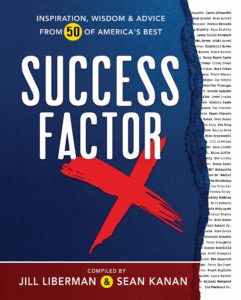 Advice from 50 of America’s Best, which I co-authored with Jill Lieberman. We went out to 50 exceptional people and said, What’s your best advice about success? And we have everyone from Mark Cuban and Anthony Robbins to Darryl McDaniels, the founding member of Run DMC, the Professional Hall of Fame baseball players, football players, Jason Alexander from Seinfeld. There are so many people. And it’s great. Yeah, it’s amazing to get this wide, diverse group of people that all talk about some of their secrets to succeeding, and it’s interesting to see how there are a lot of common denominators. And so my acting teacher used to say, “I have more in common with a successful plumber than an unsuccessful acting teacher”.
Advice from 50 of America’s Best, which I co-authored with Jill Lieberman. We went out to 50 exceptional people and said, What’s your best advice about success? And we have everyone from Mark Cuban and Anthony Robbins to Darryl McDaniels, the founding member of Run DMC, the Professional Hall of Fame baseball players, football players, Jason Alexander from Seinfeld. There are so many people. And it’s great. Yeah, it’s amazing to get this wide, diverse group of people that all talk about some of their secrets to succeeding, and it’s interesting to see how there are a lot of common denominators. And so my acting teacher used to say, “I have more in common with a successful plumber than an unsuccessful acting teacher”.
And because there’s certain things that, no matter what you do, you need to do them to be successful. Simple examples are be on time, conduct yourself with integrity. Do your best to help other people. Be not just disciplined, but self-disciplined. Deliver more than is expected of you, all of those sorts of things. And it’s amazing to find a guy that’s in Run DMC says the same thing that’s a guy that’s a Hall of Fame baseball player or a guy that runs a multinational corporation. They all do many of the exact same things to achieve success.
ILLUMINATE: That’s really fascinating. And I like that they all have those same core values and that really is the secret to success. All those things like having integrity, being on time, being honest. That’s the advice that they gave and that’s the through line between their interviews.
KANAN: Yeah, I think character is the one quality more than anything else that defines our destiny. Way of the Cobra, COBRA is an acronym formed from the words Character, Optimization, Balance, Respect and Abundance. And I really harp on how character is everything and character is what we do when no one is watching. It’s how you treat somebody because it’s the right thing to do, not the easy thing to do. And the difference between being kind and being nice.
The book is set up that I’m the sensei and you’re a student in my dojo. The chapters are divided up into belts from white to black. And these are the strategies and the philosophy I’ve used in my life to achieve some of my success and to get me through some of my harder times. And I absolutely believe in the words that are in the book. I use autobiographical stories to illustrate and teach some of the lessons. I wish somebody gave me this book when I was younger. That’s all I can say about it. And if people would like to order it, you can get a signed copy of Way of the Cobra dot com (wayofthecobra.com), or if you just want to get the book itself, you can get it on Amazon or the e-book on Kindle.
chapters are divided up into belts from white to black. And these are the strategies and the philosophy I’ve used in my life to achieve some of my success and to get me through some of my harder times. And I absolutely believe in the words that are in the book. I use autobiographical stories to illustrate and teach some of the lessons. I wish somebody gave me this book when I was younger. That’s all I can say about it. And if people would like to order it, you can get a signed copy of Way of the Cobra dot com (wayofthecobra.com), or if you just want to get the book itself, you can get it on Amazon or the e-book on Kindle.
ILLUMINATE: Well, I’m going to go and get your books now! I’m excited to read them.
KANAN: If you want to get the other, if you want to get the other to get them for me because I can get them to you much quicker, but I’m happy to do it!
ILLUMINATE: Awesome!
KANAN: Yeah. And I really think you’ll like them. Way of the Cobra is in no way, shape or form for only people that study karate or are fans of Karate Kid or Cobra Kai. If you are, you will absolutely love it just an extra little bit more. But you don’t have to, to appreciate all of it. People ask me how I came up with the book and I was at a point in my life when I had had some pretty significant success. I had had some pretty epic failures, some of which were rather public. And I was looking in the mirror going, “All right, man, what’s next? What’s Act II here?” I was 35 lbs overweight. I had no prospects for acting work. I was interacting with some old demons more than I probably would like to admit and I realized that I needed to start doing some things very differently, very quickly.
And I did. I started doing some things very differently and very quickly. I started achieving some amazing results. And in one year, I lost the 35 lbs. We got Studio City on the air, and Season I got nominated for 19 Emmys. My second book, Success Factor X, became an Amazon release bestseller. And I don’t say that to impress people, but I say to impress upon them what can happen when you’re really willing to get specific and tap into what your “why is”. Your “why is” that thing that motivates and propels you.
It’s the thing that gets you up off the ground when you’ve had your ass kicked. And it’s the thing in the gym that gets you to do one more rep. For me, my “why is”, I look down at my wedding band. That’s my “why”. I never want to see a look of buyer’s remorse in my wife’s face. I never want to see her looking at me like I’m not living up to my potential. And so that’s what fuels me, that, and inspiring other people, and everybody’s “why’s” is different. You know what? If you get clear with your “why” and you get clear with what your success is and, you know, success is a funny thing.
We all have certain things that we want in our lives to feel successful. We want love. We want friendship. We want a feeling of connectedness and a feeling that our work life feeds us, but there’s certain things that you have, Rachelle, that you need to feel successful that I don’t necessarily need and vice versa. Right? You’ve got to get clear with what your success is.
What would your life have to look like for you to feel successful? Success is the journey, but it’s also a destination, and you need to know where you’re headed. And so I tell people, let me tell you what success is not. Success is not the bloated Instagram feed of conspicuous consumption paraded by celebrities. And I say, “Look, I’ve worked in Hollywood for 35 years, and trust me when I tell you that much of that is not real anyway.” And my uncle has this great saying. He said, “Things aren’t always what they seem. Skim milk masquerades as cream.” I really love that. Success is not the airbrushed covers of fitness magazines and fashion magazines telling people that they have to look like impossibly attainable, physical representations of ourselves. And it’s not the constant bombardment of Madison Avenue commercials telling us that we have to have this or that to be successful. We all have an internal barometer that tells us what it is that we need to feel successful.
ILLUMINATE: I agree! We all have our own timeline and our different ideas of what success is for us personally.
Before we go, do you have any new projects you’d like to tell us about?
KANAN: We have new episodes of Studio City coming out. I’m very excited. You can catch me on The Bold and the Beautiful, CBS, Channel 2 in Los Angeles. I do have some other very big projects coming out later in the year, but you have to wait and see what those are.
The big thing right now is that I’ve just been promoting my book, Way of the Cobra, which I’m so passionate about. We just did a huge book signing at Barnes and Noble at The Grove, and it was an amazing success, but more than just the success, it was the energy that was there among the people there interacting. Me having a chance to to talk with them about the book.
Everybody left there was such a positive, good feeling that I was really kind of walking on cloud nine for a little while there and that’s what I got going on. I look forward to you getting the book. I think you’ll really enjoy it. And I look forward to seeing this article.
I really, really appreciate it. It was wonderful talking to you, and I hope you’ll stay in touch because I would really love to hear about all the wonderful things that you’re achieving.
ILLUMINATE: Definitely. Thank you so much!
https://www.youtube.com/watch?v=9aaGWtK4rIc


